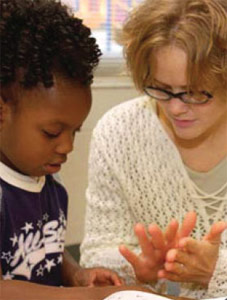Fanshawe programs put you on the path to jobs in mental health
 Fanshawe offers many opportunities to work in the mental health field.
Fanshawe offers many opportunities to work in the mental health field.The mental health field is one of the most unique professions you can engage in. The ability to make a difference in the community, help make a positive change in someone's life and immerse in an unending demand for workers are just some of the benefits that mental health workers are rewarded with in their jobs.
The School of Human Services at Fanshawe features a plethora of programs for different minds that all want to make a difference, including autism and behavioural science, developmental service worker, and child and youth worker.
The child and youth program is unique, because instead of the conventional eight-month academic period most go through, the program offers a fourth-month academic period followed by a four-month work period where you get your hands dirty and feet wet in the field. The program takes three years to complete, so you come out of the program with 12 months of work experience and networking connections. Not a bad deal.
For the placement in first year, you'll be placed in an elementary school doing work with higher need students who may have behavioural or learning issues. The second-year placement is usually done in group homes or children's treatment facilities, and your final year features placements with family and children services providing support to high-risk families and children. You'll have the opportunity to work psych units, mood disorders clinics and eating disorders clinics, just to name a few. The study periods include taking a variety of courses such as abnormal psychology, how to treat disorders, child abuse, and drugs and society.
Child and youth workers are people that we will always lean on as children and teens are continually faced with mental challenges in their lives, and Wynie Dearlove, the field placement coordinator for the program, said she thinks that there will always be a demand for them. "We come with a very specific skill set. I think it's a broad enough skill set, but the framework of academic learning that our students do and the framework that they come into it with really looks at the whole person, so it's a very holistic approach to treatment," she said. "In psychiatry, often a psychiatrist will meet with someone, counsel them briefly and then give them a bottle of pills. We look at it from a much broader perspective."
The mental health field is a challenging one, and not everyone is cut out to be a child and youth worker. We are very lucky to have people who want to take that challenge and help people in need, and it takes a unique type of person to do it. Dearlove said an aspiring child and youth worker should have a sense of humor, the ability to be adaptable to various situations and the motivation to connect and help empower them to improve their lives.
If you would like more information about what the School of Human Services has to offer, check them out in D3005. For more information about working in the mental health field in Ontario, as well as job postings and other resources, head to workinginmentalhealth.ca.













